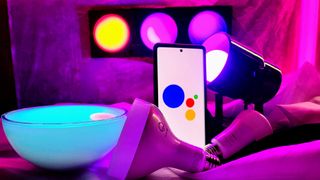One of the best Google Nest Hub (2nd Gen) features is likely coming to Android phones
What you need to know
- Google has been spotted working on a “personalized speech recognition” feature for Assistant.
- The experimental feature will improve how the voice assistant recognizes words and names you frequently say.
- This was spotted in a string of code within the latest update to the Google app.
One of the most annoying aspects of Google Assistant on Android phones is its inability to recognize the exact words you speak. This is particularly true in non-English-speaking territories, where some words might be uncommon, but Google is apparently cooking up a solution.
According to 9to5Google (opens in new tab), the search giant is working on a feature called “personalized speech recognition” for Assistant. The experimental capability surfaced in a string of code found within the latest version of the Google app.
Assuming the feature goes live, it will record audio and store it on your device in order to adjust the speech recognition model based on the voice data. This means Assistant (opens in new tab) will get better at recognizing what you frequently say, including names and uncommon words.

Keeping audio on the device also allows for more relevant and timely responses. Of course, you can always delete audio that has been saved on your device by disabling personalized speech recognition.
Google also wishes to protect user privacy by sending a summary of model adjustments to Google servers rather than personally identifiable information such as user names.
“These summaries are aggregated across many users to provide a better model for everyone,” the feature’s description states. This suggests that the speech recognition feature builds upon the Assistant’s federated learning model for the “Hey Google” hotword, which was announced in March 2021.
This enables Assistant to analyze your voice not only when you say “Hey Google” but also when you give actual commands and queries.
It’s worth noting that this capability already exists in the Nest Hub (2nd Gen), thanks to its machine learning chip that processes your frequent queries on the device. Its potential arrival on many of the best Android phones in the future should come in handy for many users.
